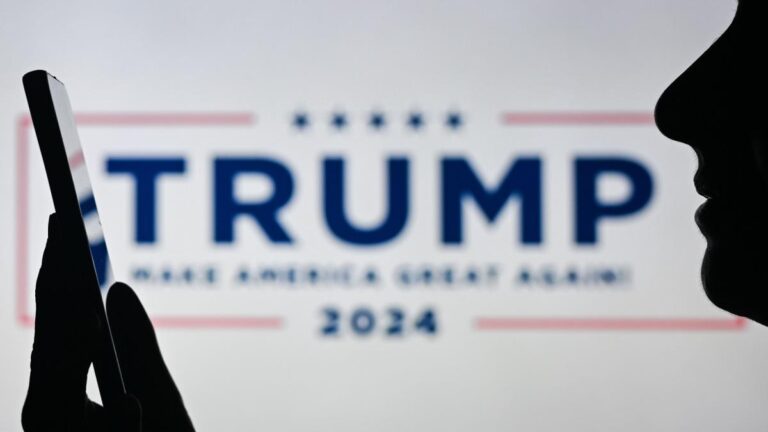
Tech and artificial intelligence (AI) stocks have been volatile following recent comments from former president and Republican presidential candidate Donald Trump about raising tariffs on China and his stance on Taiwan (which, in an interview with Bloomberg, he said accounts for “about 100 percent of our semiconductor business”).
Check it out: Social Security: How much is Senator Lindsey Graham’s Social Security benefit?
Read next: 6 Unusual Ways to Make Extra Money (That Actually Work)
As Wedbush Securities analyst Dan Ives said in a statement afterward, the tech stock selloff was “brutal” and Trump’s comments “sparked panic in the Streets over semiconductors, AI revolution stocks and big tech companies.”
While those sectors have since recovered, Nvidia shares, for example, plummeted that day, as did shares of Taiwan Semiconductor Manufacturing Co. (TSMC), “the world’s largest contract chipmaker,” according to The Wall Street Journal.
For example, Nvidia was down 0.29% at noon on July 23, but is up an astounding 155.7% year to date.
“President Trump’s ominous comments about China this week have raised serious concerns that a trade war with China could come soon and bring the AI party music to a halt,” Ives said in a statement. But Ives added that this won’t stop the “AI party.”
It remains to be seen whether this is just a passing phenomenon or a harbinger of things to come and the future direction of AI and tech stocks, but it could depend on other factors, several experts said.
“The main driver is not the election but expectations of the next Fed rate cut,” said Vijay Malloria, founder and chief investment officer at Regal Point Capital Solutions.
Wealthy people know the best financial secrets. Learn how to replicate them.
Will a Trump victory undermine the “AI revolution” or further strengthen these sectors?
According to Peter C. Earl, a senior economist at the American Institute for Economic Research, the first and most important factor to consider when thinking about what would happen to U.S. stocks if a particular candidate were to take office is to look at where that candidate currently stands.
Earl argued that despite some pullbacks over the past month, stock prices and valuations are currently so high that it’s becoming increasingly likely the market needs to take a breather before rising again.
“This becomes even more likely when you consider that most of the recent rally has come from six or seven stocks, with most of the stock market trading flat or slightly down compared to early 2024,” he said.
But he added that tariff negotiations and protectionism, a key feature of the Trump administration, cast some doubt on the future upside for AI stocks.
“The core of the AI market are the chipmakers, some of which may be in China, so there’s going to be a lot of tension there,” Earl added.
No matter who wins, AI innovation will not stop, but we should be prepared for some fluctuations.
As Ives noted, the “Trump Trade” is not a slam dunk for the AI revolution or the tech bull market, but to some extent a long and drawn-out negotiation.”
Several experts agreed with this premise, saying that no matter what happens in November, the momentum of technology and AI will be hard to stop.
“While several big names in tech have begun to publicly support Trump in recent weeks, the tech industry is thriving under a Biden-Harris administration,” said Blaine Sims, head of product at TruBit. “So, barring very specific regulatory issues, it’s hard to argue that tech will move in a different direction based on the election.”
“Any changes in trade or regulatory policies that restrict AI buildouts after the U.S. election in November could also hurt the tech sector,” BlackRock analysts wrote in a July 22 commentary. But they added that they “remain focused on the AI theme and for now view the sudden selloff as an opportunity to increase risk taking.”
“Such an environment calls for new investment strategies,” they added.
What should investors keep in mind?
“Trees don’t grow to the sky, so we expect continued volatility in the near term,” said Regal Point Capital Solutions’ Maloria.
“But as we get closer to certainty that Trump will be president again, stocks, including tech and AI, will likely rally,” he said. “Investors with a long-term view could find stocks like Nvidia, Supermicro and Broadcom at attractive prices in the coming days and weeks.”
Other financial experts such as Michael Collins, CFA, founder and CEO of WinCap Financial, echoed similar sentiments, noting that tech and AI stocks could be at risk in the short term due to possible regulatory changes if Trump wins.
“However, we expect demand for technology and AI solutions to continue to grow, so the long-term momentum should remain unabated,” he said. “This could present an excellent buying opportunity for investors who believe in the sector’s long-term growth and are willing to weather some short-term volatility.”
Collins said investors should also be mindful of policy and regulatory changes that could affect the industry in the long term, as well as a potential economic downturn that could affect consumer spending on tech products.
Editor’s note on election coverage: GOBankingRates is nonpartisan and strives to provide objective coverage of all aspects of the economy and balanced reporting on politically focused financial stories. More coverage on this topic can be found at GOBankingRates.com.
More from GOBankingRates
This article originally appeared on GOBankingRates.com: What a Trump victory could mean for tech and AI stocks

